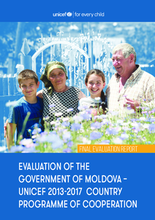Executive Summary
This document represents the “Evaluation of Government of Moldova - UNICEF 2013-2017 Country Programme of Cooperation (CPC)”. The evaluation was conducted between August 2016 and February 2017.
Objectives and Purpose of the Evaluation
The main objectives of the CPC 2013-2017 evaluation were the following:
- to assess the relevance, efficiency, effectiveness, sustainability, coherence and impact of the CPC;
- to generate useful knowledge for the development of the new country programme and Strategic Note;
- to build the capacities and empower stakeholders through fostering participation in evaluation.
The evaluation had thus both summative and formative aspects.
The purpose of the evaluation was multi-fold: a) to guide UNICEF strategic and programme intervention prioritising in the new programming period 2018-2022; b) to provide recommendations to accelerate the achievement of equitable and sustained outcomes for the most vulnerable children in the new CPC 2018-2022; c) to contribute to the planning of UN Development Assistance Framework (UNDAF) 2018-2022.
Evaluation Object
The object of the evaluation was the CPC 2013-2017. Its overall goal was to support the government and civil society to bring about greater social inclusion of children and their families who are at risk of exclusion due to geographic disparities, poverty, ethnicity, disability, gender, and lack of or poor parental care. The CPC aimed to reach its overall goal by achieving two Outcomes:
- By 2017, the Government addresses disparities in access to quality education, health, protection and justice services for disadvantaged children and families
- By 2017, governance structures and social attitudes are more child-sensitive and equity oriented
The State Chancellery was assigned the role of coordinating partner of the overall CPC. The role of UNICEF was to ensure the technical and financial assistance for the implementation of the programme, while also bringing in evidence, knowledge on children and policy advocacy leverage for the attainment of intended results.

